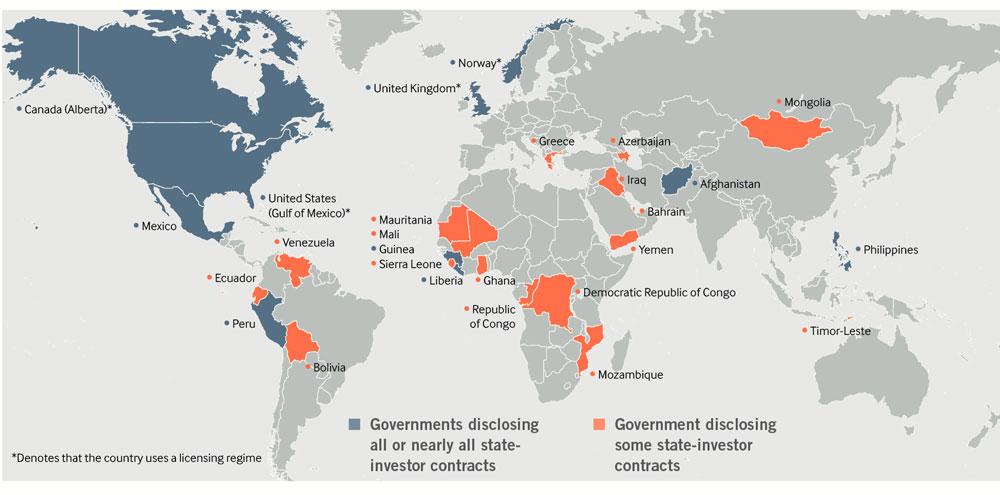
EITI and the Emerging Global Norm of Contract Transparency
With discussions on contract transparency featuring prominently in next week’s Extractive Industries Transparency Initiative (EITI) global conference, NRGI, CCSI, Oxfam America and the Open Contracting Partnership have put together a briefing on the current state of play of contract transparency in the oil, gas and mineral sector. Here are some of the main highlights:
Contracts signed between governments and resource companies are the fundamental documents that set out the terms of oil, gas and mining investments in many countries. By keeping them secret:
- Companies undermine their “social license to operate” and give an advantage to unscrupulous and under-qualified rivals.
- Governments miss out on the competitive benefits that transparency of contract terms brings.
Disclosure is already happening, and the sky isn’t falling.
- Open online contract repositories such as ResourceContracts.org and the OpenOil repository have collected over 900 contracts and associated documents that are already in the public realm. That number is growing every day.
- An increasing number of producing country governments are encouraging contract publication. There are now more than 25 countries that have published contracts and more are coming on board over time.
- Companies are also publishing their contracts. While there were initial fears that this would lead to a backlash from investors, these concerns have proven unfounded.
- International institutions including the World Bank, the IFC, the IMF, and the International Bar Association are supporting contract disclosure.
But mind the gap(s)…
- Section 3.12a of the EITI Standard encourages EITI-implementing countries to “publicly disclose any contracts and licenses that provide the terms attached to the exploitation of oil, gas and minerals.” Furthermore, in section 3.12b, it is a “requirement that the EITI Report documents the government’s policy on disclosure of contracts and licenses that govern the exploration and exploitation of oil, gas and minerals...”, including “an overview of the contracts and licenses that are publicly available …”
- Some countries aren’t delivering on this requirement. A recent analysis of 29 EITI reports that were submitted in 2014 revealed that many countries were failing to declare government policy on contract transparency, while five countries (Burkina Faso, Côte d’Ivoire, Mauritania, Republic of Congo, Democratic Republic of Congo) were failing to live up to their own disclosure laws.
- And when contracts are published, there are often serious gaps in user outreach and capacity. Thankfully, there are some great early lessons that implementers can draw from. For example in Cambodia, civil society was able to access the key terms of an oil contract disclosed by the operator and carry out an analysis with the support of Oxfam America. Those results provided a reality check on both the project and the potential revenues experts had expected to flow to the government. This is an important added value from contract disclosure as EITI seeks to encourage disclosure of more relevant and timely information.
What governments can do:
- Publish their contracts in an accessible, digestible manner, including summaries of the key contract terms.
- Start a conversation with companies and civil society concerning contracts that are not in the public domain.
- Fully implement contract transparency laws and better, envision the transition to a law-based regime, less reliant on contracts.
- Analyze and use information to negotiate better, more balanced deals, backed up by robust modelling.
- Adopt open contracting throughout the whole process of concession awards.
Read the full briefing here.
Gavin Hayman is the executive director of the Open Contracting Partnership. Isabel Munilla is the senior policy advisor, extractive industries at Oxfam America. Rob Pitman is a governance officer at the Natural Resource Governance Institute. Perrine Toledano is head of extractive industries at the Columbia Center on Sustainable Investment.


